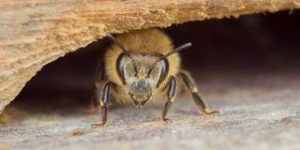The honeybee was always treated with respect by mankind. With respect for the bee colonies, people benefited in a moderate way from the bee products like honey, wax and propolis. Beside the bees that were kept in skeps, the bees still had their place in the landscape surrounding us. They lived in hollow trees and old buildings.
With the rise of intensive agriculture and animal husbandry people changed their attitude towards animals, including the bees. For the convenience of the beekeeper, wooden beehives with removable frames were introduced. Active manipulation of the colonies became a general practise ever since. Colonies were artificially propagated by making splits from the existing colonies in the apiaries.
With the higher mobility of mankind it became easy to obtain bee colonies from other regions and countries. The bee turned into a commodity that was held, bred and manipulated at will by the modern beekeeper. All this for higher yields and profit. The wellbeeing of the honeybee colonies became less important.
Over the last decades the wild honeybee almost totally disappeared from the landscape and the life of the bees kept in apiaries has been totally disrupted.
Natural propagation by swarming is blocked by the beekeeper and in many cases the natural proces of open mating is replaced by queen breeding programs that that totally rely on artificial insemination.
Furthermore we take to much of the precious honeystores with high nutritional value from the bees and replace these with sugarwater. But also the housing of the bees in convenient hives has disadvantages for the bees. Natural partnerships and symbioses with other animals and organisms, not recognized by man, are made impossible by the way we keep the bees.
All these dramatic changes that compromised the natural way of the bee, resulted in very weak bees that are prone to pests and diseases. With the modern view on “sick bees” we tend to see a quick solution in the use of antibiotics and chemicals. Mankind trusted long time in symptom management instead of looking at underlying problems.
The honeybees and the beekeepers live in a broken relationship that needs to be repaired as soon as possible!

















